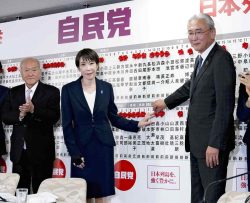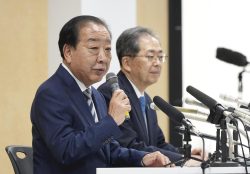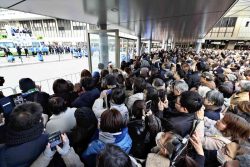
The leaders of seven political parties hold hands at a debate at the Japan National Press Club in Tokyo on Saturday.
15:02 JST, October 13, 2024
The leaders of the seven ruling and opposition parties faced off in a debate at the Japan National Press Club in Tokyo on Saturday ahead of official campaigning for the upcoming House of Representatives election set to kick off Tuesday.
The debate focused mainly on political reforms following a recent political funds scandal involving factions in the ruling Liberal Democratic Party, as well as security policies and economic measures.
Prime Minister Shigeru Ishiba, who also serves as LDP president, referred to the lower house election, which will be held on Oct. 27, as one that will help “create a new Japan” and expressed the need to make fundamental changes to the nation.
When asked about his signature idea of revising the Japan-U.S. Status of Forces Agreement, Ishiba said: “We must not give up. We will discuss this within the party and advance discussions with other parties.”
“I definitely want to realize [the revision],” he added.
Regarding an idea of creating an Asian version of the North Atlantic Treaty Organization, Ishiba said: “Security issues won’t attract votes, but we must discuss them. Why was Russian aggression against Ukraine possible? A similar situation could happen in Asia tomorrow.”
Yoshihiko Noda, president of the Constitutional Democratic Party of Japan, the largest opposition party, vowed to break the majority the ruling coalition of the LDP and Komeito has in the lower house to regain public trust in politics that has been undermined by the LDP’s funds scandal.
“The LDP leader has been replaced and a new prime minister has taken office. But if the situation doesn’t change, I believe a change of government is the biggest political reform,” Noda said.
Leaders of other political parties also took part in the debate: Keiichi Ishii of Komeito; Nobuyuki Baba of the Japan Innovation Party; Tomoko Tamura of the Japanese Communist Party; Yuichiro Tamaki of the Democratic Party for the People; and Taro Yamamoto of the Reiwa Shinsengumi.
Many party leaders criticized the LDP for what they called its old-fashioned style of politics, expressing the need to overhaul politics and make the use of political funds transparent.
“Political activity funds are legal. We will use them in a restrained manner,” said Ishiba, when he was asked about whether the LDP will allow its members to use political activity funds while campaigning.
However, he said he intends to discuss the possibility of abolishing the funds in the future within the party.
During the debate, Ishiba was also asked about his stance on nuclear eradication following the previous day’s news that Nihon Hidankyo, or Japan Confederation of A- and H-Bomb Sufferers Organizations, won the Nobel Peace Prize.
He expressed hopes to create a world free of nuclear weapons but stopped short of supporting Japan signing the Treaty on the Prohibition of Nuclear Weapons and joining treaty meetings even as an observer.
“It is necessary to verify whether the abolition of nuclear weapons is possible while recognizing the deterrent effect [of nuclear weapons],” Ishiba said.
Meanwhile, Baba said the JIP, which has gained more seats in the Diet in recent years, is aiming to win in single-seat constituencies outside the Kansai region, which is their home base.
Top Articles in Politics
-

Japan PM Takaichi’s Cabinet Resigns en Masse
-

Sanae Takaichi Elected Prime Minister of Japan; Keeps All Cabinet Appointees from Previous Term
-

Japan’s Govt to Submit Road Map for Growth Strategy in March, PM Takaichi to Announce in Upcoming Policy Speech
-

LDP Wins Historic Landslide Victory
-

LDP Wins Landslide Victory, Secures Single-party Majority; Ruling Coalition with JIP Poised to Secure Over 300 seats (UPDATE 1)
JN ACCESS RANKING
-

Japan PM Takaichi’s Cabinet Resigns en Masse
-

Japan Institute to Use Domestic Commercial Optical Lattice Clock to Set Japan Standard Time
-

Israeli Ambassador to Japan Speaks about Japan’s Role in the Reconstruction of Gaza
-

Man Infected with Measles Reportedly Dined at Restaurant in Tokyo Station
-

Videos Plagiarized, Reposted with False Subtitles Claiming ‘Ryukyu Belongs to China’; Anti-China False Information Also Posted in Japan






















